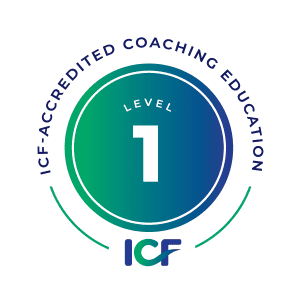ICF Level 1 Education Associate Certified Coach (ACC)

What is the ICF Associate Certified Coach (ACC) Credential?
The International Coaching Federation (ICF) has established the Associate Certified Coach (ACC) Credential as the initial level of certification available to coaches. ICF ACC certification is intended for those who have completed 60 hours of training, possess a basic comprehension of coaching competencies, and need 100 hours of coaching experience. The ACC Credential is a globally recognized testament to a coach’s dedication to excellence and professionalism. It is a stepping stone to the more advanced levels of the ICF’s certification program, such as the PCC and MCC designations.

Upcoming Classes – ICF Level 1
| Type & Delivery | Instructor | Date | Cost & Registration | Flexible Payment Option |
|---|---|---|---|---|
| Instructor-Led ( Online ) | Madhavi | $1899 | later @ no added cost* |
|
| Instructor-Led ( Online ) | Sivakumar Padmanaban | $1899 | later @ no added cost* |
|
| Instructor-Led ( Online ) | Madhavi | $1899 | later @ no added cost* |
|
| Instructor-Led ( Online ) | Sivakumar Padmanaban | $1899 | later @ no added cost* |
|
| Instructor-Led ( Online ) | Madhavi | $1899 | later @ no added cost* |
|
| Instructor-Led ( Online ) | Sivakumar Padmanaban | $1899 | later @ no added cost* |
|
| Instructor-Led ( Online ) | Madhavi | $1899 | later @ no added cost* |
|
| Instructor-Led ( Online ) | Sivakumar Padmanaban | $1899 | later @ no added cost* |
|
| Instructor-Led ( Online ) | Madhavi | $1899 | later @ no added cost* |
|
| Instructor-Led ( Online ) | Sivakumar Padmanaban | $1899 | later @ no added cost* |
|
| Instructor-Led ( Online ) | Madhavi | $1899 | later @ no added cost* |
|
| Instructor-Led ( Online ) | Sivakumar Padmanaban | $1899 | later @ no added cost* |
|
| Instructor-Led ( Online ) | Madhavi | $1899 | later @ no added cost* |
|
| Instructor-Led ( Online ) | Sivakumar Padmanaban | $1899 | later @ no added cost* |
|
| Instructor-Led ( Online ) | Madhavi | $1899 | later @ no added cost* |
|
| Instructor-Led ( Online ) | Sivakumar Padmanaban | $1899 | later @ no added cost* |
|
| Instructor-Led ( Online ) | Madhavi | $1899 | later @ no added cost* |
|
| Instructor-Led ( Online ) | Sivakumar Padmanaban | $1899 | later @ no added cost* |
|
| Instructor-Led ( Online ) | Madhavi | $1899 | later @ no added cost* |
|
| Instructor-Led ( Online ) | Sivakumar Padmanaban | $1899 | later @ no added cost* |
|
| Instructor-Led ( Online ) | Madhavi | $1899 | later @ no added cost* |
|
| Instructor-Led ( Online ) | Sivakumar Padmanaban | $1899 | later @ no added cost* |
Enquire Now
Coach / Trainer
Sivakumar Padmanabhan
Vijaya Madhavi
PROGRAM DETAILS – ICF ACC CORE COACHING COMPETENCIES CERTIFICATION
Language Used: English
-
- Core Coaching Competencies Skill Drill
- Intensive Markers Lab
- CKA Assessment Preparation
- NLP Practitioner Techniques
- Wellness, Empowerment, and Happiness Tools
- Self-awareness and self-management strategies
- Relationship management and Social awareness strategies
- Leadership Circle Profile in a professional setup
Class Delivery: Online
-
- Zoom – Live Classes
- Mural -Collaboration
- Mighty Networks – E-Learning.
- WhatsApp – Group Communication
Duration: 5-6 Months
-
- Live Teaching Sessions
- Live Coaching demonstrations
- Regular 1:1 Peer Coaching- Offline
- Group Mentoring Sessions
- 1:1 Mentoring Sessions
- Lifetime access to the learning Portal.
- Private Coaching Sessions on Request
- Coaching Tools for Customization
- Small Group Cohort with 15 Students Only.
Who Should Attend ICF Level 1 Certification (Core Competencies)?
If you want to advance in business, ICF Level 1 Certification Core Competencies is a great place to start. Past participants have included heads of human resources, managers from learning & development teams, CEOs and CXOs, consultants, and trainers. Professional coaches are ideal for those who want to take their careers to the next level, upgrade their capabilities, go through a career transition, retire, start-up founders, entrepreneurs, managers, and students who want their coaching to be part of a business initiative.
Learning Objectives for Associate Certified Coach ACC Credential
Demonstrating Ethical Practice: To be good at coaching, it is imperative to understand what is ethical and unethical in this line of business. Coaches should respect ethical and legal standards with all clients, sponsors, and other interested parties. The following are essential to indicate clients’ identities, backgrounds, experiences, values, and beliefs, avoid microaggressions, labeling, and stereotyping, and always use ICF’s Code of Ethics and Core Values.
Embodying a Coaching Mindset: This means cultivating and sustaining a positive and receptive attitude towards change, tools, and the client. It also means understanding that clients own their choices, embracing lifelong use of learning and development, and having an ongoing practice of reflection to enhance coaching practice. Identifying evidence-based intuition, personal reflection to assist clients, presence and management of effect, preparation for sessions, and acknowledging when seeking additional supervision might also be beneficial.
Cultivating Trust and Safety: Coaches must collaborate with clients to create a safe and secure space to express themselves freely. They should strive to understand the client’s identity, environment, values, and beliefs and adapt their coaching to their needs. Coaches should also recognize and value the client’s unique talents and insights and work in the coaching process, show support, empathy, and care for the client, and support their feelings, perceptions, concerns, beliefs, and suggestions by using openness and transparency to show vulnerability and build trust.
Presence of Mind: Keeping presence is an important factor for effective coaching, which can be managed by focusing on the client, being alert and compassionate, and responding to their needs. Coaches should be engaged and control their emotions in order to stay in the moment and create a space for thought and reflection.
Active Listening: Listening actively involves considering the client’s background, identity, surroundings, experiences, and beliefs and then reflecting or summarizing what they’re saying to ensure it’s clear and understood. Coaches should also look for patterns in the client’s behavior and emotions over time to identify themes and designs.
Evoking Awareness: This technique facilitates client insight and learning through tools and techniques such as powerful questioning, silence, metaphor, or analogy. Coaches should consider the client’s experience when deciding what may be most beneficial, challenge the client to elicit awareness or insight, inquire about the client’s way of thinking and values, needs, wants, and beliefs, and ask questions beyond current thinking.
Facilitating Client Growth: It is crucial to collaborate with clients to turn knowledge and understanding into action. Coaches should encourage client autonomy in the coaching process and work with clients to bring new knowledge, experience, or learning into their view of the world and their behavior. They should collaborate with clients to create goals, actions, and accountability measures that integrate and broaden their growth.
Leadership Coaching: Effective leaders need to be able to think creatively and adapt to changing situations. Creative thinking involves coming up with new ideas, methods, and approaches to problem-solving, as well as being able to challenge existing beliefs. On the other hand, reactive thinking involves being able to respond quickly and effectively to unexpected events, such as crises, challenges, or changes in the business environment.
The Path to Becoming an Accredited ICF ACC Associate certified Coach
The journey to becoming an ICF ACC Associate Certified Coach involves several steps:
Step 1- Finish Coach Training: To qualify for ACC ICF, coaches must complete at least 60 hours of ICF Coaches-specific Training. Coaches must complete training in an ICF-accredited or ICF Level 1 Certification.
Step 2- Acquire Coaching Experience: Coaches must have completed a minimum of 100 hours of professional coaching experience, including a minimum of 75 hours of professional paid coaching, following the completion of a ACC Certificate Programs and within the preceding 18 months.
Step 3- Submit an Application: Once the necessary training and experience have been obtained, coaches may apply for ICF level 1 coaching course. This certification process involves submitting evidence of training and experience and completing a coach knowledge assessment.
Step 4- Complete the Coach Knowledge Assessment: The coach knowledge assessment (CKA) is a multi-choice test that assesses a coach’s knowledge of ICF Core competencies and the ICF Code of Ethics. Coaches must complete the CKA to earn ICF ACC Certification.
Step 5- Certification Renewal Every 3 Years: The ICF ACC Coaching Certification is valid for three years. Coaches must complete 10 hours of Mentoring and 40 hours of Coach Continuing Education every three years and follow the ICF Code of Ethics.
Popular Tags:
Associate Certified Coach, ICF Level 1, ICF ACC, ICF Level 1 Certification, ICF ACC Certification, ACC Certification, ACC Credential, ACC Certificate Programs, ACC Coaching Certification, ACC Certification Programs, ACC Certification ICF, ICF Certification ACC, ACC ICF, ICF Level 1 Coaching Course, ICF Level 1 Accreditation






